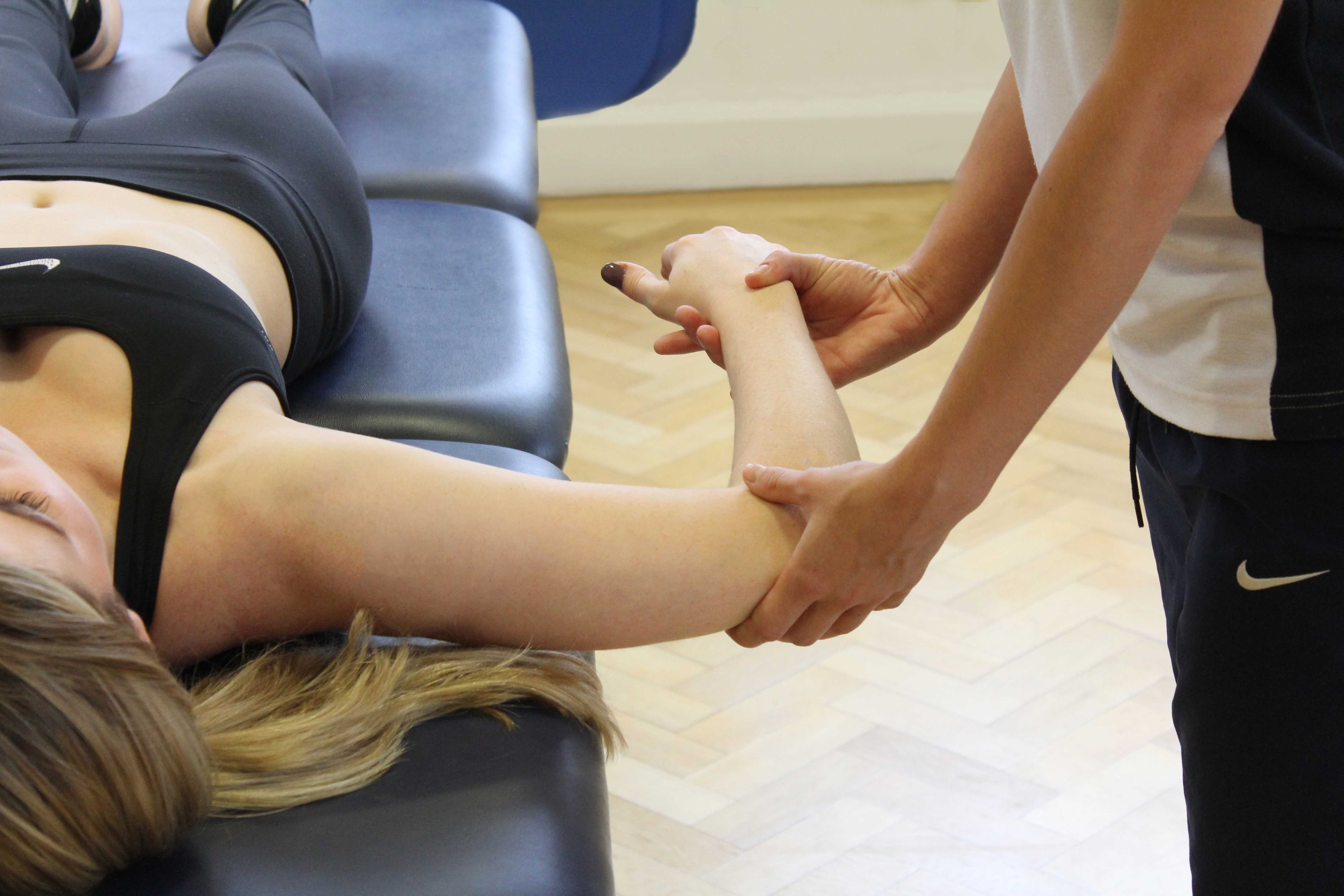Sub acromial impingement occurs when the rotator cuff tendons, which lie underneath the acromion, become compressed leading to inflammation and pain. The rotator cuff muscles are located on the scapula and attach to the upper part of the humerus via tendons which run under the acromion. There also lies a bursa to help reduce friction, which if compressed can also become inflamed and painful. There are 2 types of impingement. These are:
- External;
- Primary – abnormalities of the acromion e.g. hooked or curved or osteophytes formation, will encroach on the sub-acromial space from above
- Secondary – here the scapula stabilising muscles are not balanced and so your scapula is placed into an abnormal position during movement (scapular dyskinesis) reducing the sub-acromial space
- Internal – the rotator cuff tendons impinge against the under surface of the glenoid (scapula socket) due to increased anterior capsular laxity
 Above: Glenohumeral joint mobilisation and stretches
Above: Glenohumeral joint mobilisation and stretchesPhysiotherapy prior to Sub-acromial Decompression
Physiotherapy is an essential and highly effective form of treatment of sub-acromial impingement. A main problem associated with sub-acromial decompression is scapular dyskinesis. Physio.co.uk will address these muscular imbalances and correct them in order to restore normal scapula position and accurate biomechanical movement to prevent encroachment of the sub-acromial space. Physio.co.uk will also help manage acute episodes as well as treat underlying pathologies associated with impingement to reduce symptoms and manage your condition. Treatment will include:
- Biomechanical assessment – highlighting incorrect movement and muscular imbalances
- Cryotherapy
- Pain management
- Taping – restore correct shoulder position and retrain weak muscles
- Soft tissue release
- Muscle strengthening
- Scapular re-training throughout range
- Stretches
- Home exercise programme
- Advice on surgical management
Symptoms following Sub-acromial Decompression
Following sub-acromial decompression your shoulder will be placed in a protective sling which you will be encouraged to discard within 4 days. Symptoms you may experience following surgery include:
- Pain
- Swelling
- Bruising
Physiotherapy following Sub-acromial Decompression
Following surgery, Physio.co.uk will provide a thorough assessment of your shoulder detailing specifics of your surgical procedure and highlighting areas of weakness which need to be addressed. Physio.co.uk will develop and implement a personal rehabilitation programme focussed on target areas and personal goals.
Weeks 1-3
Initial treatment will focus on the acute management of symptoms and the reduction of post surgical complications. Muscle imbalances will be targeted and corrected early as to ensure correct biomechanical movement and prevent secondary problems. Treatment will consist of:
- Cryotherapy
- Pain management
- Passive and active assisted range of movements below shoulder height
- Pendular exercises
- Soft tissue release
- Electrotherapy
- Scapular stability
- Range of movement and strengthening exercises for elbow, wrist and hand of affected arm
- Sling management
- Advice and education
Weeks 4-6
After 3 weeks of physiotherapy with Physio.co.uk you will have regained mobility in your arm and will have seen an improvement in your strength and function. Our goal now is to improve these results through a continuation and progression of your exercises. Strengthening exercises and functional tasks will begin to be incorporated. Treatment will consist of:
- Soft tissue release
- Joint mobilisations
- Passive and active assisted range of movement above shoulder height
- Active range of movement below shoulder height above shoulder height
- Scapular stability through range
- Rotator cuff strengthening
- Begin proprioceptive training
Weeks 7-12
Physio.co.uk will now intensify your rehabilitation in order for you to attain your surgery milestones and return to sporting and recreation activities as soon as possible. A strong focus will be on attaining full range of movement, improving stability and increasing strength throughout range in order to prevent future re-occurrence. Treatment will include:
- Active range of movement above head height
- Joint mobilisations
- Rotator cuff strengthening in outer limits
- Scapular stability in outer limits.
- Muscle hypertrophy
- Muscular endurance
- Proprioceptive training
- Specific functional tasks
- Begin integration of sport/task specific exercises
Weeks 12+
Following 12 weeks of intense physiotherapy with Physio.co.uk your shoulder will be returning to its pre-operative state and you will have seen considerable increases in movement strength and function. Our goals now are to maintain and improve on these outcomes and to integrate back into sporting and recreational activities. Complete recovery may take up to 6 months and Physio.co.uk will continue to provide effective rehabilitation to ensure an effective and timely return to all sporting activities. Treatment will include:
- Achievement of full range of movement
- Advanced strengthening
- Advanced proprioceptive exercises
- Functional/sport training
- Home exercise programme
- Advice and long term management
Summary
Sub-acromial decompression is an arthroscopic surgical operation to increase the sub-acromial space to allow pain free full range of movement. The sub-acromial space lies under the acromion of the scapula providing a cover for your rotator cuff to pass under to attach on to your humerus. This space can become narrowed through structural abnormalities, abnormal scapular movement caused through muscular imbalances or through capsular laxity. All these factors cause impingement of the rotator cuff leading to pain, inflammation and a loss of movement. Once this space has been enlarged, Physio.co.uk will maintain this through restoration of correct biomechanical movements and muscle imbalances. Physio.co.uk will provide an extensive and personal rehabilitation programme to ensure your shoulder returns to its normal function with a clear focus on returning to all your occupational, recreational and sporting activities. Call Physio.co.uk now on 0330 088 7800 for more information or to book an appointment please contact us.

 0330 088 7800
0330 088 7800


































